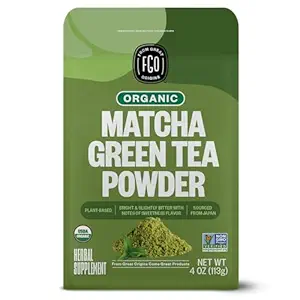Matcha, the vibrant green powdered tea, has been gaining popularity in recent years for its potential health benefits. But is matcha truly good for you? This article delves into the scientific evidence behind matcha's health claims, exploring its unique composition and potential effects on various aspects of well-being.

Key takeaways:
• Matcha is rich in antioxidants, particularly catechins
• It may boost brain function and improve focus
• Matcha could support heart health and metabolism
• More research is needed to confirm some potential benefits
The antioxidant powerhouse
Matcha stands out among teas for its exceptionally high antioxidant content. The primary antioxidants in matcha are catechins, particularly epigallocatechin gallate (EGCG). A study published in the Journal of Chromatography A found that matcha contains up to 137 times more EGCG than other green teas[1].
These antioxidants help combat oxidative stress in the body, which is linked to various chronic diseases and aging. Research suggests that the catechins in matcha may have anti-inflammatory and cancer-fighting properties[2].
Cognitive benefits and focus
One of matcha's most touted benefits is its potential to enhance cognitive function. This effect is attributed to its unique combination of caffeine and L-theanine, an amino acid that promotes relaxation without drowsiness.
A study published in Nutrients found that consuming matcha improved attention, reaction time, and memory in young adults[3]. The L-theanine in matcha may also help reduce stress and anxiety, potentially leading to improved focus and mental clarity.
Heart health and metabolism
Emerging research suggests that matcha may have positive effects on cardiovascular health. A review published in the International Journal of Molecular Sciences found that green tea catechins, including those found in matcha, may help reduce the risk of cardiovascular disease by improving lipid metabolism and reducing inflammation[4].
Additionally, some studies indicate that matcha could boost metabolism and aid in weight management. A study in the American Journal of Clinical Nutrition found that green tea extract increased energy expenditure and fat oxidation in humans[5].
Potential drawbacks and considerations
While matcha offers numerous potential benefits, it's important to consider some potential drawbacks:
• Caffeine content: Matcha contains more caffeine than regular green tea, which may cause side effects in sensitive individuals.
• Lead contamination: Some studies have found that matcha may contain higher levels of lead than other teas due to the way it's grown and processed[6].
• Interactions with medications: The catechins in matcha may interact with certain medications, so it's important to consult with a healthcare provider if you're taking any medications.
Conclusion:
The scientific evidence suggests that matcha can indeed be good for you, offering a range of potential health benefits from antioxidant protection to cognitive enhancement. However, more research is needed to fully understand its long-term effects and optimal dosage. As with any dietary change, it's best to incorporate matcha into a balanced diet and consult with a healthcare professional if you have any concerns.
Interested in learning more about how to optimize your health and longevity? Subscribe to our newsletter for the latest science-backed insights and tips.
References:
Citations:
[1] https://www.healthifyme.com/us/
[2] https://www.hsph.harvard.edu/news/hsph-in-the-news/matcha-brain-heart-gut-health/
[3] https://www.ful-filled.com/2018/01/23/all-about-matcha/
[4] https://www.ncbi.nlm.nih.gov/pmc/articles/PMC9792400/
[5] https://www.healthline.com/nutrition/7-benefits-of-matcha-tea














Member discussion